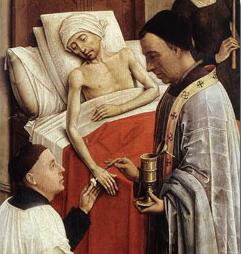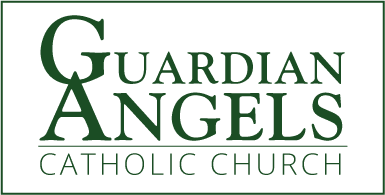
This Sacrament gives health and strength to the soul and sometimes to the body to persons who are seriously ill or are in danger of death. It is traditionally called Extreme Unction, which means last anointing (in Baptism, Confirmation and Holy Orders, the body is anointed with holy oil; Extreme Unction is the last anointing of the body with sacred oil).
Those who are in need of this Sacrament are asked to contact the parish office at 502-968-5421 to make arrangements. It is prudent to receive the Anointing of the Sick prior to serious operations or whenever there is a serious danger to health. We ask the families of Guardian Angels to contact the parish on behalf of loved ones who may be seriously ill or near death.
Does a person have to be dying to receive this sacrament? No. The Catechism says, “The anointing of the sick is not a sacrament for those only who are at the point of death. Hence, as soon as anyone of the faithful begins to be in danger of death from sickness or old age, the fitting time for him to receive this sacrament has certainly already arrived” (Catechism of the Catholic Church 1514).
The Sacrament of Anointing of the sick is administered to the sick person after the priest prays over the individual by an anointing with Holy Oil in the form of a Cross on the forehead and hands while the priest says, “Through this holy anointing, may the Lord help you with the grace of the Holy Spirit; may the Lord free you from your sins and raise you up.” (Extreme Unction is administered on the person’s eyes, ears, nostrils, lips, hands and feet as the priest says, “Through this holy anointing, and by His most tender mercy, may the Lord pardon you what sins you have committed by sight, hearing, speech, and so on). The Sacrament of Anointing has these effects for your soul: it gives you more Sanctifying Grace; helps you to bear your sufferings; strengthens you against the temptations of the devil; sometimes gives you back your health; takes away temporal punishment due to sin; and prepares you for immediate entry into Heaven. This Sacrament does take away sin, both venial and mortal-if you are unable to confess them but are truly sorry for them.
“The special grace of the sacrament of the Anointing of the Sick has as its effects: the uniting of the sick person to the passion of Christ, for his own good and that of the whole Church; the strengthening, peace, and courage to endure in a Christian manner the sufferings of illness or old age; the forgiveness of sins, if the sick person was not able to obtain it through the sacrament of penance; the restoration of health, if it is conducive to the salvation of his soul; the preparation for passing over to eternal life” (Catechism of the Catholic Church 1532).
